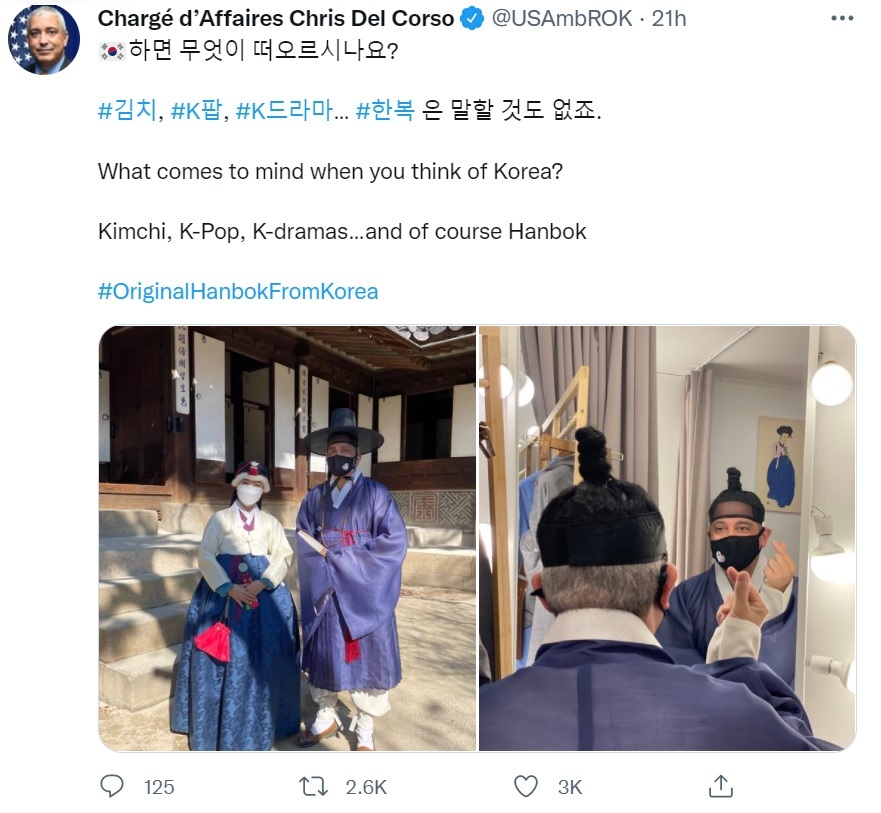 |
Christopher Del Corso, charge d`affaires ad interim at the US Embassy in Seoul, posts photos of himself wearing hanbok on his Twitter on Tuesday, in this captured image. (Twitter) |
The top US diplomat to South Korea released a photo donning hanbok and backing its origin as Korean on Tuesday, in an apparent response to the controversy sparked by China’s alleged cultural appropriation over the traditional Korean attire during the opening of the Beijing Winter Olympics.
Christopher Del Corso, charge d’affaires ad interim at the US Embassy in Seoul, posted two pictures of himself wearing hanbok while touring historic places on his Twitter on Tuesday.
“What comes to mind when you think of Korea? Kimchi, K-Pop, K-dramas...and of course Hanbok,” he wrote on the post, with the hashtag #OriginalHanbokFromKorea.
Del Corso’s post comes as the South Korean public has taken umbrage at what they view as China laying claim to their traditional attire at the Beijing Games. During Friday’s opening ceremony, a troupe of performers representing 56 minorities of China carried the Chinese national flag into the stadium. One woman was wearing hanbok, apparently representing ethnic Koreans in China, called “joseonjok.”
However, the scene of a hanbok-clad woman identified as one of China’s ethnic groups touched off strong reactions here, with politicians, including leading presidential candidates, denouncing it as misleading and as part of “cultural appropriation.” It also touched on South Korea’s public sensitivity about recent Chinese claims of some parts of Korean culture, including kimchi, the Korean dish made of fermented cabbage or other vegetables.
In response, the Chinese Embassy in Seoul released a rare statement rebutting such “cultural appropriation” accusations as “nonsense,” stressing that hanbok belongs to the people on the Korean Peninsula as well as ethnic Koreans in China.
“It is their desire and right for representatives of each ethnic group in China to wear their traditional costumes and attend the international sports competition of the Beijing Winter Olympics and major national events,” the embassy’s spokesperson said in a statement Tuesday. “Ethnic Koreans in China and the North and South of the Korean Peninsula share the same lineage and common traditional culture, including clothing.”
The official added that China respects Korea’s historical and cultural tradition, while expressing hope for the Korean side to “respect the emotions of China’s various ethnic minorities, including joseonjok.”
The Foreign Ministry here on Tuesday said it had “correctly” delivered South Koreans’ concerns of cultural appropriation of the hanbok via appropriate channels. And the Chinese side had said it is aware of the related public opinion in Korea and that what happened during the ceremony has nothing to do with the cultural origins of hanbok.
According to sources, Beijing had told Seoul that there was nothing to be concerned of in a cultural perspective, as the fact that hanbok is part of Korea’s traditional culture remains unchanged.
By Ahn Sung-mi (
sahn@heraldcorp.com)



![[AtoZ of Korean mind] Ever noticed some Koreans talk to themselves?](http://res.heraldm.com/phpwas/restmb_idxmake.php?idx=644&simg=/content/image/2024/11/03/20241103050186_0.jpg)
![[Breaking] North Korea fires short-range ballistic missiles: JCS](http://res.heraldm.com/phpwas/restmb_idxmake.php?idx=644&simg=/content/image/2024/11/05/20241105050038_0.jpg)



